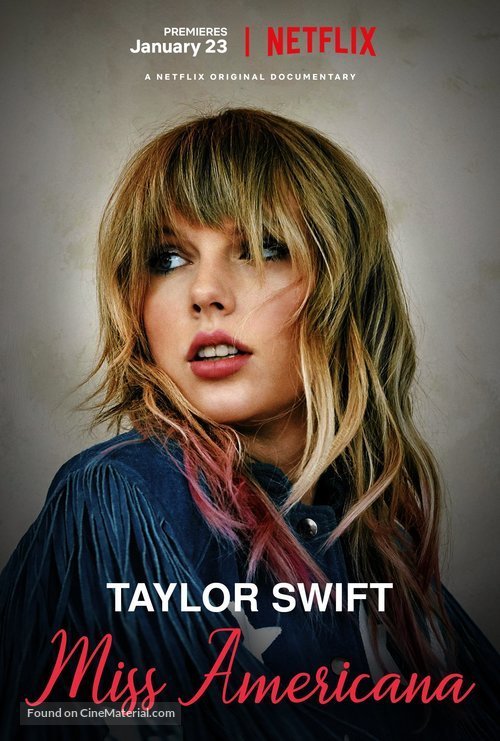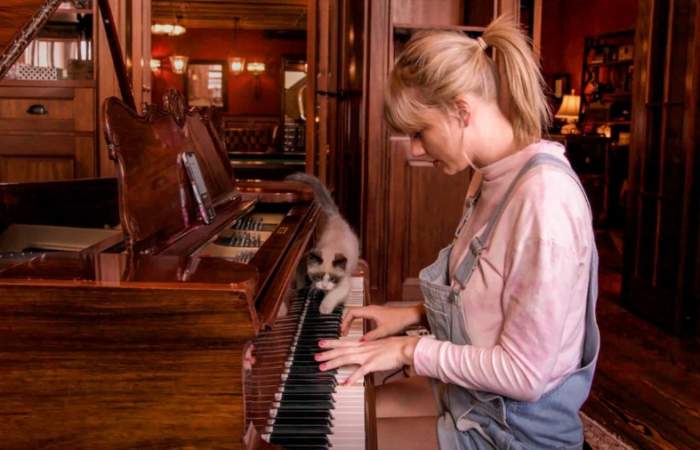By Glenn Dunks
 A film like Miss Americana is always going to be something of a piece of image rehab. It’s just a part of the process of making a documentary about the biggest pop star in the world whose mega-fame makes her equally loved and loathed (as these sorts of things always do; hi, Madonna) by large swathes of the population. And while it is unlikely that the many shouting “fuck Taylor Swift!” in boorish unison at a Kanye West concert or those whose deep-dive into stan culture is unhealthy in its obsession are unlikely to be moved – or, probably more likely, reminded that they ever cared enough about her in the first place– from the looks of it, Lana Wilson’s doc appears to have worked.
A film like Miss Americana is always going to be something of a piece of image rehab. It’s just a part of the process of making a documentary about the biggest pop star in the world whose mega-fame makes her equally loved and loathed (as these sorts of things always do; hi, Madonna) by large swathes of the population. And while it is unlikely that the many shouting “fuck Taylor Swift!” in boorish unison at a Kanye West concert or those whose deep-dive into stan culture is unhealthy in its obsession are unlikely to be moved – or, probably more likely, reminded that they ever cared enough about her in the first place– from the looks of it, Lana Wilson’s doc appears to have worked.
Many journalists and listeners who once criticised her for any number of reasons (her perceived lack of sincerity, her cunning, her dating life, her choice of friends, a craven need for attention, etc) have come out to perform mea culpas and many casual observes of its subject’s meteoric rise to fandom acknowledging that maybe, just maybe, she’s human after all despite everything that they had been previously led to believe...

Premiering as one of the opening night films at this year’s Sundance Film Festival, Miss Americana may seem like something of a peculiar choice for it’s director, too.
Wilson’s most well-known film before this is her 2013 debut, After Tiller, for which she won an Emmy, about the assassination of a doctor who performed abortions in Kansas. Despite the disparity in such topics, the two feel more at home together than any initial scepticism may suggest. After all, Miss Americana (titled, in case you’re unaware, after her song “Miss Americana and the Heartbreak Prince”) weights in on some pretty heavy subject matter all its own: Swift’s sexual abuse trial, her political awakening, body issues, women's issues, mental health, the double standards of gender, the need for reinvention, and a host of others (curiously not the Scooter Braun issue, nor, er, Cats).
Anybody who has listened to her music on loop will have heard these themes arise plenty of times before. Swift is, after all, a very open songwriter. It’s why fans respond to her so much, myself included. Basic creatures that so many of us are, we yearn to see and hear our own experiences reflected back at us. And it’s partly why I prefer the messy combination of dreamy romantic potential with messy petty male bullshit of albums like Reputation and its subsequent tour than the (predominantly) loved-up gooeyness of 2019’s Lover.

Which is a long way of me saying that I appreciated the roughness that Miss Americana gives Swift. Rather than focusing on the seemingly happily-ever-after romance between her and British actor Joe Alwyn – despite being the inspiration for many of the love songs off her two most recent albums, we never see his face – but instead using the platform to speak to issues that perhaps its target audience have never seen before in such a format.
It’s awfully easy to watch Miss Americana and still see Swift as very calculated in what she includes and what she doesn’t, discussing what she does only for the attention and because a camera is planted on her face as she does it. I suppose one has to choose to believe in her sincerity, which is something the film is quite obviously trying to do by asking us to see there's more to her than the public perception. But one of the virtues of the documentary is watching Swift shift from being somebody who was desperately eager for the world to love and adore her to somebody who chooses instead to say what she wants to say and sing the songs she wants to sing. Yes, she is a white, blonde and very, very rich person, but she’s also still barely 30 years old and as we chart her career from singing to family as a kid to performing on a global stadium tour, Wilson astutely observes the incredible pressure and pseudo arrested development she experienced and has come out the other side of seemingly well-adjusted (Kanye West, not so much it would seem).
Jumping between the making of both Reputation and Lover albums and various public appearances at award shows and concerts, audiences who don’t know their “Delicate”s from their “Style”s may find the editing from a five-piece team somewhat confusing. It would have also been nice to see elements of her impeccably constructed Taylor Swift: Reputation Stadium Tour, directed by Paul Dugdale and also available on Netflix (I'm rewatching it right now as I write), as further proof of her talent, work ethic and – most importantly – connection to audience. I would suggest watching both. Not just because they’re perfectly aligned, but because they’re both great examinations of fame within the contemporary music world while offering well-made glimpses into the various sides of the ultra-famous. I have no doubt that many reading this will be rolling their eyes at the thought of spending 90 minutes with Taylor Swift, firm in their ideas about her. I hope they take a look. Ultimately, Miss Americana is probably the most appropriate way to start 2020 and hopefully sets a tone for more thoughtful discourse for the decade ahead.
Release: Streaming now on Netflix.
Oscar chances: They could, and have, done worse. But that'd be a no. It's just not what the branch goes for these days. However, it does have a (maybe?) original song titled "Only the Young" that might be eligible and there is an entire stretch where Swift if seen creating the song in real time. The music branch has definitely done worse.